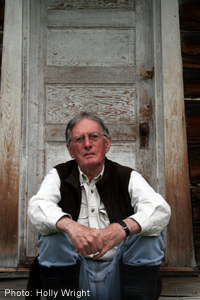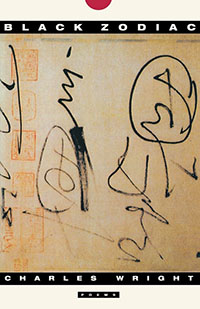A Tennessean’s Way of Seeing
Charles Wright’s Pulitzer-winning poems are Southern at their core
From a distance, the Memphis airport is designed to look like martini glasses hanging above a bar. I went there to pick up Charles Wright the day after he won the Pulitzer Prize for his book Black Zodiac. He was flying back to Tennessee to give a poetry reading at Union University. It was the spring of 1998. He’d been interviewed the night before on the PBS NewsHour by a slightly bemused Elizabeth Farnsworth, who hadn’t known what to make of his claim that “Death’s still the secret of life, the garden reminds us. Or vice-versa.” Wright’s poems, with their otherworldly yearnings and their penetratingly observed settings in the Umbrian hills of central Italy, in Montana, in the lee of Virginia’s Blue Ridge, seem to have little to do with his home state. My students, reading him in Tennessee, never immediately pick up on his Tennessee background. I was looking forward to congratulating my teacher.
 Black Zodiac was Charles Wright’s twelfth book of poetry. He was sixty-two years old, well into as successful a career as an American poet can hope for: he’d won a National Book Award, held an endowed professorship; an appointment as U.S. Poet Laureate was waiting in his future. On the surface of it, it would be hard to claim Black Zodiac as a Tennessee book, much harder than the books of Peter Taylor, Charles’ good friend and retired colleague at the University of Virginia, books that maintained more direct ties to his home state, with titles like In the Tennessee Country and A Summons to Memphis, which had won the Pulitzer for fiction a decade earlier. But Charles Wright is a Tennessee writer, too, in equally essential ways. His broadly influenced and influential work resonates with Tennessee colloquial language, simple phrases such as “They’ve gone and done it again,” or homely terms like “lonesomeness” illumined by meditations on the modern art of Morandi, Cézanne, and Rothko. His work is as regional and universal as William Faulkner’s with its seamless incorporation of European modernism (in Wright’s case, Heideggerian phenomenology and Eastern mysticism) into a local method.
Black Zodiac was Charles Wright’s twelfth book of poetry. He was sixty-two years old, well into as successful a career as an American poet can hope for: he’d won a National Book Award, held an endowed professorship; an appointment as U.S. Poet Laureate was waiting in his future. On the surface of it, it would be hard to claim Black Zodiac as a Tennessee book, much harder than the books of Peter Taylor, Charles’ good friend and retired colleague at the University of Virginia, books that maintained more direct ties to his home state, with titles like In the Tennessee Country and A Summons to Memphis, which had won the Pulitzer for fiction a decade earlier. But Charles Wright is a Tennessee writer, too, in equally essential ways. His broadly influenced and influential work resonates with Tennessee colloquial language, simple phrases such as “They’ve gone and done it again,” or homely terms like “lonesomeness” illumined by meditations on the modern art of Morandi, Cézanne, and Rothko. His work is as regional and universal as William Faulkner’s with its seamless incorporation of European modernism (in Wright’s case, Heideggerian phenomenology and Eastern mysticism) into a local method.
The Pulitzer sometimes seems to be given as a lifetime achievement award. More commonly, I think, it is bestowed a book too late, given to recognize the previous book no one had the sense to know was as good as it was, rather than for the one that actually wins it. With Charles the prize may have come several books too late. He’d been a finalist in 1982 for The Southern Cross, in 1983 for Country Music: Selected Early Poems, in 1985 for The Other Side of the River, and in 1996 for Chickamauga. It got to be a joke among those who cared about his writing and its fortunes. The weight of the award is such that poets have made a career out of being named a finalist once. It’s always a short shortlist: usually three books. Being named to it sets you apart. You can never again consider yourself a writer’s writer, superior in your chaste obscurity.
Black Zodiac is representative enough of Wright’s work. The first poem, “Apologia Pro Vita Sua,” offers an outline of his entire project:
Journal and landscape
—Discredited form, discredited subject matter—
I tried to resuscitate both, breath and blood,
making them whole again
Through language, strict attention—.
Journal and landscape. Wright’s primary obsession has always been with landscape. As he confessed to Elizabeth Farnsworth on the NewsHour, he finds landscape “ravishing.” Despite its astrological title, Black Zodiac retains a Tennessee savour grounded in the places of Sullivan County, the South Fork of the Holston River, plenty of honeysuckle and magnolia. Perhaps it is this appetite for “Language, the weather, the word of God” that makes him open to the wooded and mystical philosophy of Martin Heidegger. “Sundays define me,” he writes,
Born on a back-lit Sunday, like today,
But later, in August,
And elsewhere, in Tennessee, Sundays dismantle me.
There is a solitude about Sunday afternoons
In small towns, surrounded by all that’s familiar
And of necessity dear….
He refuses to bury his Tennessee past beneath his erudition, even in this book decades removed from the last time he lived in the state.
Wright was born at Pickwick Dam at one end of Tennessee and grew up in Kingsport, 425 miles away at the other, with a few war years spent in Oak Ridge. In the lobby of the state park lodge at Pickwick, there’s a 1930s-era photograph blown up to mural size of the dam-construction crew, and somewhere in that group of laborers is Wright’s jodhpur-wearing engineer father. No matter how cosmopolitan the content of Wright’s poetry, with its Eastern influences, its Italian landscapes and Continental philosophy, there remains an Americanness and a Southernness at its core that may be felt in his preoccupation with family and family stories, the shaping forces of nature and clan, his love for the music of the Carter Family, the depth he finds in seemingly simple folk forms.
 The form he appropriated for his poems is that of a journal. From his 1987 book Zone Journals onward, Wright’s poems have often been presented as journal entries. What is simpler, less distorted by artifice, than a journal? He has famously claimed to be the only Southerner who cannot tell a story, but the journal is a kind of ultimate narrative, story in its purest embodiment, uninterested in manipulation, a constantly revising record of what one sees and feels and has come to think about it. His interest in the phenomenology of Martin Heidegger surely affected his choice of this “discredited” form: Heidegger sensed that all understanding is radically historical, that we are constantly in dialogue with nature and must be quiet and attend.
The form he appropriated for his poems is that of a journal. From his 1987 book Zone Journals onward, Wright’s poems have often been presented as journal entries. What is simpler, less distorted by artifice, than a journal? He has famously claimed to be the only Southerner who cannot tell a story, but the journal is a kind of ultimate narrative, story in its purest embodiment, uninterested in manipulation, a constantly revising record of what one sees and feels and has come to think about it. His interest in the phenomenology of Martin Heidegger surely affected his choice of this “discredited” form: Heidegger sensed that all understanding is radically historical, that we are constantly in dialogue with nature and must be quiet and attend.
In “Jesuit Graves,” which remains my favorite poem of the book, Wright uses the journal form to fashion an elegy that bears discussing with the finest elegies written by an American. Not as grandly ambitious as “When Lilacs Last in the Dooryard Bloom’d,” which is journal-like in its own way, and not occasioned by as significant an event as was moving Whitman, Wright’s elegy for Gerard Manley Hopkins is nevertheless as worthy as other great American elegies, echoing Pound’s pact with Whitman, drawing much from Frank O’Hara’s Billie Holliday elegy, as questioning as Roethke’s “Elegy for Jane,” as philosophical as Allen Tate’s graveyard poem, “Ode to the Confederate Dead.” The subject of this Tennessean’s elegy is not an American, though there is a singularity of voice in Hopkins that is decidedly un-British, a discarding of class and convention and European models. Hopkins is the Emily Dickinson of British poetry, completely ignored by the poets around him and jarringly ahead of his time. He’s not even buried in England. Charles was a tourist in Belfast, being shown the sites by Seamus Heaney. One would guess Hopkins’ grave was an important stop on the tour.
Art is a scaffolding, the poem says, a form-buttressing skeleton, but also a gallows, a site of sacrifice, a cross. Hopkins’ sense of a divinely charged creation would be attractive to a poet who in Black Zodiac writes that “Landscape’s a lever of transcendence.” Wright is a product of Flannery O’Connor’s Christ-haunted South, though the tones of his work are exploratory and truth-seeking rather than the certainty-hardened stances one meets in O’Connor’s world. The thinking in his poems is supple and marked by humility, content to express wonder at nature rather than use it as a kind of proof-texting, as Hopkins is wont to do.
That night in Jackson, hours after the Pulitzer announcement, I suppose it could be said we were witnessing Charles Wright at the height of his powers. Much strong work was still to be written—his magnificent 2009 book Sestets comes to mind—what John Berryman in his William Carlos Williams dream song called “the mysterious late excellence.” We’d gotten out news of the prize as best we could with phone calls, emails, word of mouth, but I was concerned about the size of the audience willing to show up for a poetry reading on a Thursday night. The Pulitzer Prize in poetry is still a poetry prize. But the students and townspeople came, townspeople perhaps curious to see what a Pulitzer Prize-winner looked like, and students who had graduated from high school affairs with Sylvia Plath’s Ariel and undergraduate bouts of reading Eliot’s Four Quartets as a devotional text, to have lately become acolytes of this living poet, a Tennessee poet returned to his home ground an easy hour’s drive from his birthplace. He stepped to the microphone, bent open a still-new copy of Black Zodiac, and began to read.

Bobby C. Rogers is professor of English and writer-in-residence at Union University. He earned an M.F.A. from the University of Virginia, where Charles Wright was his teacher. His first book, Paper Anniversary, won the Agnes Lynch Starrett Poetry Prize. His second book, Social History, has just been released. He lives in Memphis.

This essay is part of the Pulitzer Prize Centennial Campfires Initiative, a joint venture of the Pulitzer Prize board and the Federation of State Humanities Council in celebration of the 2016 centennial of the Prizes. For their generous support of the Campfires Initiative, we thank the Andrew W. Mellon Foundation, the Ford Foundation, Carnegie Corporation of New York, the John S. and James L. Knight Foundation, the Pulitzer Prizes board, and Columbia University.


